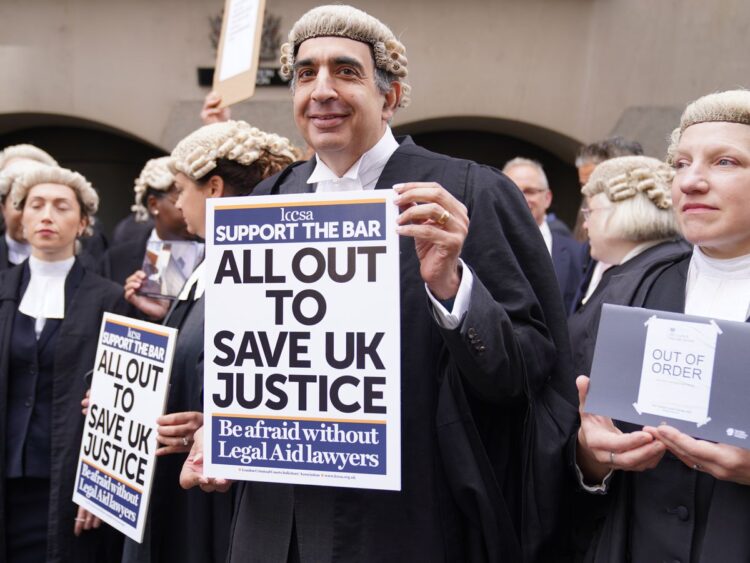By Lucy Caulkett-
Criminal barristers in England and Wales have began a strike over legal aid fees on Monday, as they warn the profession is facing an “existential crisis” because of inadequate funding.
The Criminal Bar Association (CBA) said the offer of a 15% uplift in fees, which was the minimum increase recommended by the criminal legal aid review (Clar), is insufficient after swingeing cuts – and will not apply to the backlog of 58,000 cases in crown courts.
Since April, hundreds of barristers have adopted ‘no returns’ as part of a push for the government to uplift rates by 25%.
Jo Sidhu QC, chair of the CBA, said they had already lost a quarter of specialist criminal barristers over the last five years, with 300 leaving last year.
The strikes are in relation to fallen incomes of nearly 30% over the last two decades and specialist criminal barristers make an average annual income after expenses of £12,200 in the first three years of practice, driving 22% of junior criminal barristers to leave since 2016.
Several barristers participating in the strike on Monday spoke of being paid less than the minimum wage for court hearings when travel and hours spent preparing are factored in. In many cases, they were not paid at all when hearings are cancelled. The revelation has exposed the myth that criminal barristers are well paid in all circumstances, despite the clout that normally accompanies the profession.
Mira Hammad, who is based in Liverpool, and was called to the bar in 2019, said: “The criminal justice system is falling apart. Cases aren’t going ahead because there aren’t enough barristers, there aren’t enough judges, there’s not enough court resources.
“As a criminal barrister you can’t earn enough, so I do inquest work as well as crime. If I was doing solely crime I would not be able to earn a living. It’s unsustainable for anyone involved in the system.
“The fact that there’s no funding in the system means that it’s also an incredibly stressful and frustrating job to do. You don’t get paid well and you’re constant
Since April, hundreds of barristers have adopted ‘no returns’ as part of a push for the government to uplift rates by 25%
The ‘days of action’ will escalate each week, culminating in a five-day walkout from Monday 18 July to Friday 22 July.
The action is to be suspended for a week before resuming on 1 August with a five-day walkout.
Barristers will walk out every other week subject to a satisfactory response from the government.
Justice minister James Cartlidge has confirmed the government expects to lay secondary legislation before 21 July that will pave the way for criminal legal aid fee increases to come into force by the end of September.
We are continuing to lobby the government to announce further fee increases to meet the 15% minimum increase for solicitors recommended in the Independent Review of Criminal Legal Aid.
“This is a make-or-break moment for the future of the beleaguered criminal justice system,” said Law Society president I. Stephanie Boyce.
“The short-term impact of direct action will pale in significance against the permanent departure of ever more criminal defence solicitors, barristers and law firms if this demanding work in the public interest is not properly rewarded.”
Barristers earn between £55,900 to £62,900 once expenses are accounted for, with many barristers claiming that the time they spend preparing cases bring their hourly earnings are below minimum wage.
Barristers with under two years of professional experience earned a median of £25,100 before expenses and a net figure of £18,800 after expenses.
The walkout centres on concerns around legal aid funding and conditions, with hundreds of barristers struggling to cope with low pay and long hours.
The Criminal Bar Association (CBA), which represents barristers in England and Wales, said 300 barristers have left the profession over the past five years.
Almost 40% of junior criminal barristers left the profession in one year, according to the group.
The more barristers leave, the more likely cases and trials are to be postponed due to missing representation – which adds to an already-massive backlog in the criminal justice system.
Decline In Real Income
Kirsty Brimelow, vice chairwoman of the CBA, told reporters highlighted the plight of barristers outside Manchester Crown Court. She said: “The Criminal Bar Association has repeatedly warned the government that the huge decline in real incomes at the criminal bar poses the most serious threat to the British legal system in decades.
“We have made our case over and over again to government but our warnings continue to fall on deaf ears.
“They have no solution to saving the criminal justice system. This is a national crisis which is of government making and it must be dealt with as a national emergency.
“We cannot allow further attacks on our profession when we know the reality of the crumbling courts and junior barristers, who walked away long before this action.
“We take this action in the name of citizens of this country because it is their justice system that we are determined to protect. We will not sit idly by and watch its destruction.
“We are doing what we have been trained to do, which is to fight for justice.”
The most recent figures from HM Courts and Tribunals Service show there were 358,076 outstanding cases at magistrates’ courts, and 58,271 outstanding cases at crown courts, as of April 2022.
Before the first lockdown, there were 38,411 crown court cases.
A No 10 spokesperson said: “The Justice Secretary himself has said we encourage them to agree the proposed 15% pay rise which would see a typical barrister earn around £7,000 a year more, so our message would be similar.
“We urge those barristers to take that pay offer and ensure that victims don’t have to wait any longer for justice than they already have.”




